How to Help Your Child Learn Piano Most Effectivel
pianosintheparks.com – Helping your child learn piano can be both rewarding and challenging. With the right support, you can create an encouraging environment that fosters growth and enjoyment. By guiding them through practice and staying involved, you can ensure their piano learning experience is both fun and productive.
See More :
- Top Piano Notes Sheet for Beginners
- Best Piano of All Time
- How Can I Play Piano?
- Top 10 Best Pianos for Beginners
- Top 5 Yamaha Digital Piano Grand Models You Must Try
Create a Positive Learning Environment
A positive learning environment is essential to help your child learn piano effectively. Establishing a conducive space for practice can significantly impact their focus, motivation, and progress. Here are some key elements to consider when setting up the ideal learning environment:
Quiet and Comfortable Practice Space
To help your child learn piano successfully, it’s crucial to create a quiet and distraction-free space where they can concentrate fully on their practice. Choose a room away from noisy areas like the TV or family gatherings. The space should be comfortable, well-lit with natural light, and at a suitable temperature. Ensure the piano or keyboard is set at the correct height to promote proper posture, preventing discomfort or fatigue. A calm environment helps children stay focused, leading to more productive piano lessons.
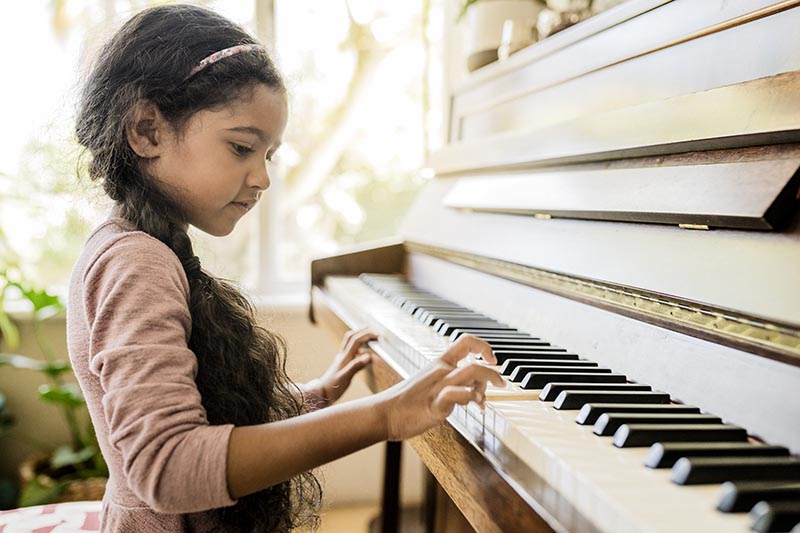
Choose the Right Instrument for Your Child’s Level
Selecting the right instrument is another critical step to help your child learn piano. Depending on your child’s age and skill level, you might opt for a digital piano or a traditional acoustic piano. Digital pianos are often more affordable, compact, and equipped with learning tools like metronomes and recording functions. However, if possible, an acoustic piano offers richer sound and helps develop finger strength and touch sensitivity. Choosing an instrument that suits your child’s needs ensures they enjoy the learning experience and are motivated to practice regularly.
Set a Consistent Practice Schedule
A regular practice routine is key to helping your child learn piano and build discipline. Start with short sessions, around 15-30 minutes per day, and gradually increase the time as your child becomes more comfortable. Consistency is more important than long practice sessions, as frequent, shorter practices help retain skills and foster steady progress. Balance is essential—allow for flexibility to avoid burnout, and tailor the practice time to your child’s daily routine and energy levels.
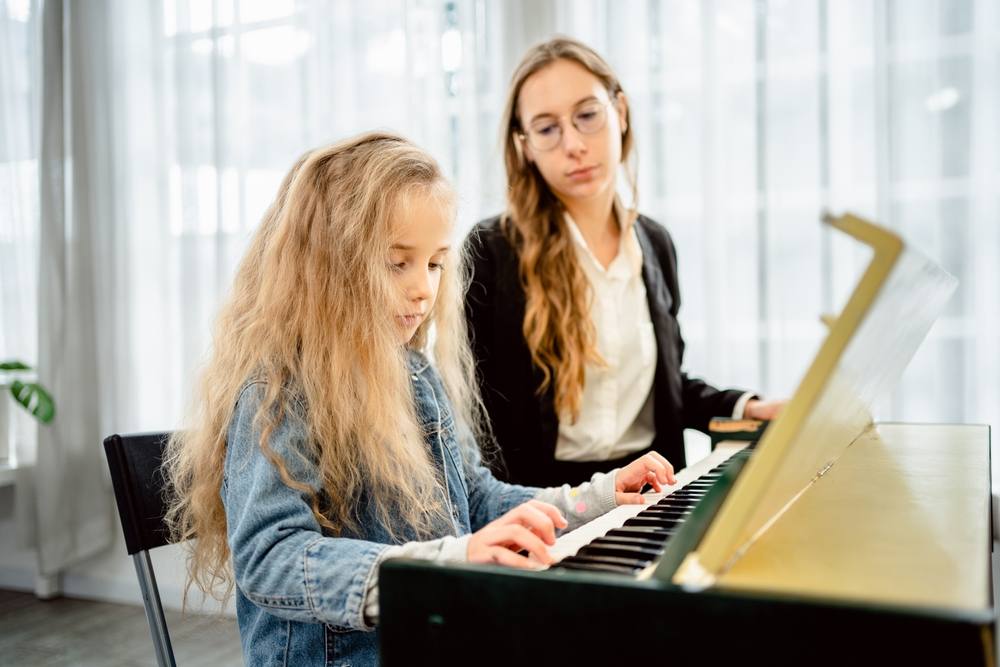
Encourage a Positive Attitude Toward Learning
Maintaining a positive attitude is vital to help your child learn piano with enthusiasm. Learning to play an instrument can be challenging, and it’s normal for children to face difficulties or frustrations. Parents should offer encouragement, praising even small improvements to build confidence and keep them motivated. Focus on the learning process rather than expecting perfection from the beginning. Reinforcing the idea that every small achievement matters fosters resilience and perseverance, helping your child enjoy and continue their piano lessons.
Choose the Right Piano Learning Method
Selecting the right learning method is crucial to help your child learn piano in a way that suits their unique needs, interests, and learning style. Here are several factors to consider when selecting the ideal learning approach:
Hire a Private Piano Teacher or Enroll in Classes
One of the most traditional and effective ways to help your child learn piano is through one-on-one lessons with a private teacher. A skilled teacher can tailor lessons to your child’s pace and preferences, providing personalized guidance, correcting technique, and introducing proper musical theory. Alternatively, enrolling your child in group classes can foster a social learning environment where they can share progress and gain motivation from peers. Both methods have their advantages—private lessons offer focused attention, while group settings can make learning more interactive and fun.
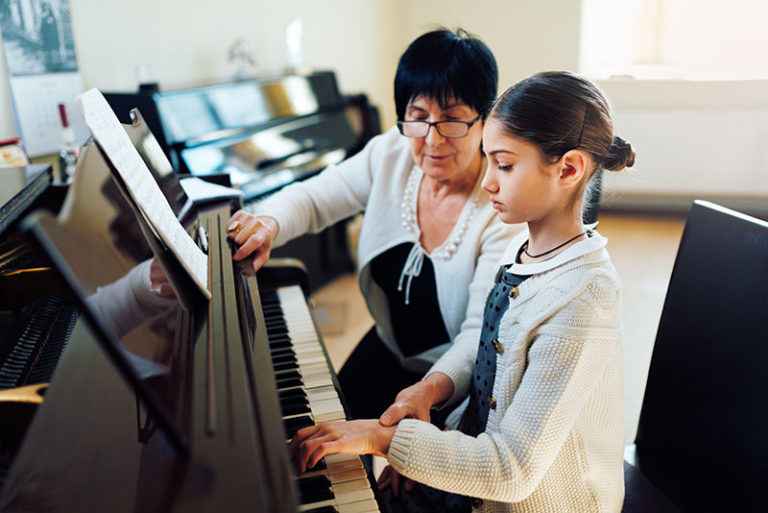
Leverage Online Courses and Piano Learning Apps
In today’s digital age, there are many online platforms and piano learning apps designed to help your child learn piano from the comfort of home. These tools often include interactive lessons, practice schedules, and engaging tutorials. Apps like Simply Piano, Flowkey, and Yousician make learning accessible, offering beginner-friendly courses and exercises. Online lessons can be especially beneficial for children who prefer learning at their own pace, allowing them to revisit difficult sections and practice on a flexible schedule. When paired with traditional lessons, these resources provide a well-rounded learning experience.
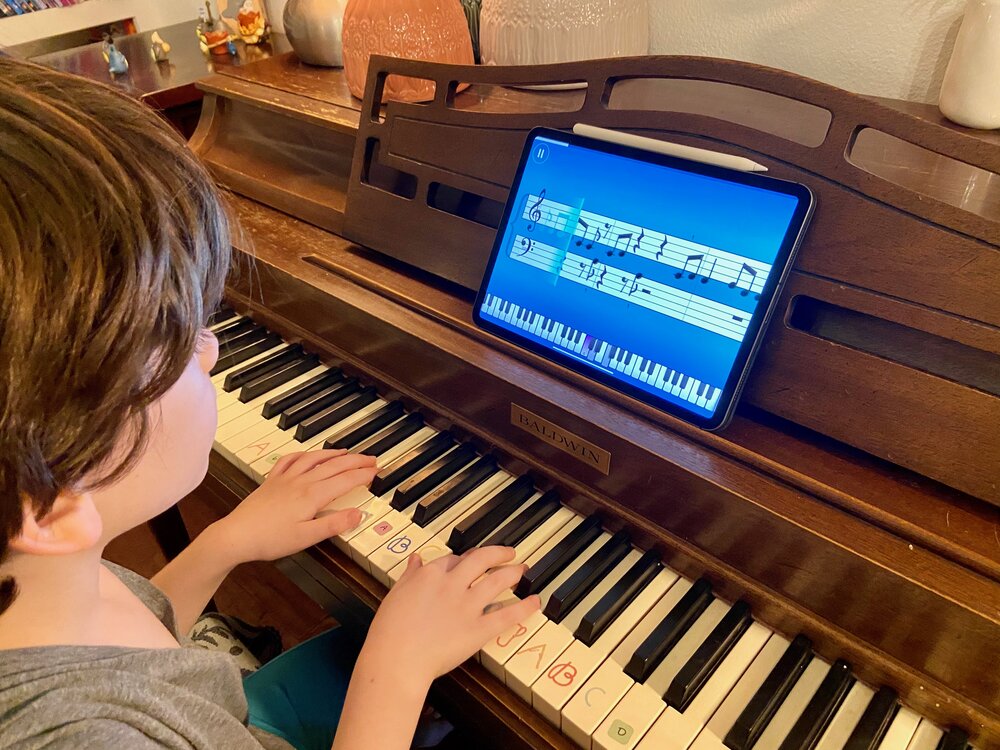
Use Age-Appropriate and Engaging Learning Materials
Choosing materials that match your child’s age and interests is key to keeping them engaged in their piano learning journey. For younger children, look for colorful, visual resources with simple songs and activities that make learning fun. Older or more advanced learners may benefit from sheet music collections of songs they enjoy or classical pieces that challenge their growing skills. Incorporating music they love into practice sessions keeps children excited about learning and encourages them to explore different musical genres.
Balance Theory and Practice
To help your child learn piano effectively, it’s essential to strike a balance between theory and practical application. While understanding musical concepts like rhythm, scales, and notation is important, children often stay more motivated when they can see progress in their playing. Ensure that lessons incorporate both learning to read music and practicing songs that resonate with them. This approach fosters a more well-rounded musical education and prevents the process from feeling too rigid or overwhelming.
Keep the Piano Learning Process Engaging
You can help your child learn piano effectively by maintaining their interest and excitement is key. A fun and engaging learning experience will inspire them to keep practicing and exploring their musical potential.
To make learning piano more exciting, consider integrating fun, hands-on musical activities into the practice routine. You can help your child learn piano by encouraging them to play simple tunes or games that reinforce musical concepts, such as rhythm or ear training. Many apps and online resources offer engaging exercises, mini-games, and challenges that make learning enjoyable. Mixing structured lessons with playful activities keeps children motivated and curious, transforming practice time into an enjoyable experience.
A great way to help your child learn piano while keeping it exciting is to expose them to various genres and styles of music. Let them explore classical, jazz, pop, and even video game or movie soundtracks. By discovering different kinds of music, children develop a broader appreciation for the piano and stay inspired to learn new pieces. Encourage them to try songs they love or listen to different performers to spark new interests and ideas. This variety helps prevent boredom and allows them to find their own musical identity.
Children can easily lose interest if they feel overwhelmed by complex pieces or long-term goals. To help your child learn piano without frustration, break down learning objectives into small, achievable milestones. These could include mastering a particular song section, improving hand coordination, or learning a new scale. Celebrate these small successes to build confidence and keep them motivated. A goal-oriented approach ensures that your child experiences regular progress, which can sustain their enthusiasm over time.
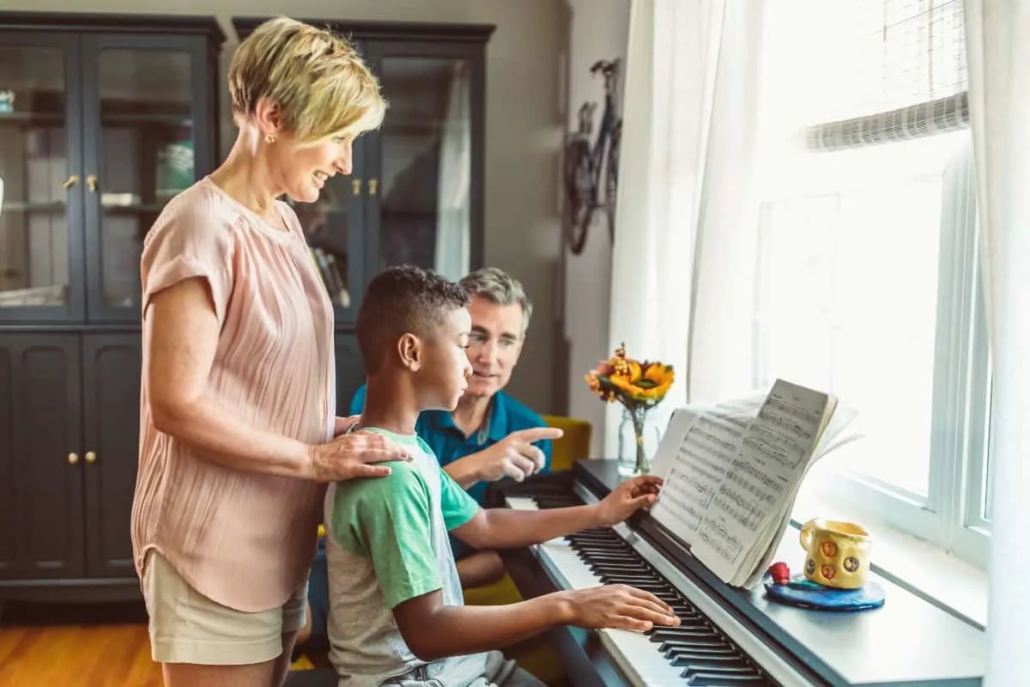
Helping your child learn piano effectively is a rewarding journey that requires patience, support, and creativity. By creating a positive learning environment, choosing the right teaching methods, and keeping the experience engaging, you can foster a love for music that lasts a lifetime. Remember that every child’s learning path is unique, so stay flexible and attentive to their needs. Celebrate their achievements, no matter how small, and encourage them to explore the vast world of music.

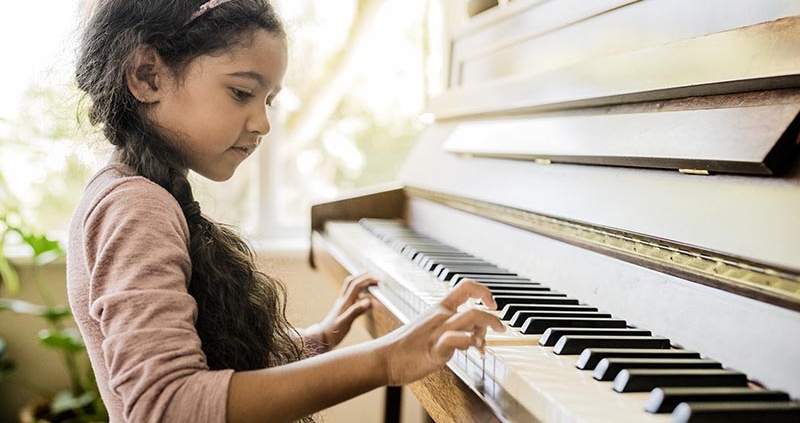

Leave a Reply
Want to join the discussion?Feel free to contribute!